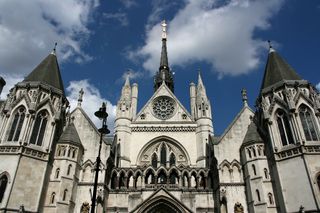
Alleged computer hacker Lauri Love today won his High Court appeal against extradition to the US to answer to charges of hacking into the computer systems of the FBI, the US Central Bank and NASA, among others.
Royal Courts of Justice judges ruled this morning that extraditing Love to the US, where he would face three separate trials, would be "oppressive" owing to the 32-year-old's likely determination to commit suicide in a US prison, considering any measures to prevent him from doing so further detrimental to his mental and physical health, with the resulting stress worsening a severe eczema condition he has, which would then impact depression he suffers from.
Instead Lord Chief Justice Lord Burnett and Justice Ouseley permitted his appeal against his extradition, stating it would "not be oppressive" to "prosecute Love in England for the offences".
"The support of his family, in particular, would mean that he would be at far lower a risk of suicide in consequence," they stated. "On the evidence we have seen, his mental and physical condition would survive imprisonment without such significant deterioration, though it would undoubtedly be more problematic for him than for many prisoners."
Love is accused of committing the alleged offences between 2012 and 2013, hacking into and stealing vast amounts of data from the US organisations.
Speaking to the BBC outside the court after the hearing, Love said he was "very thankful for all the support" he had received and hoped he had set a "precedent so this will not happen to people in the future".
The decision comes only three months after more than 70 MPs called on the prime minister to intervene in Love's extradition, writing to the UK attorney general to warn of "potentially fatal consequences" if he stands trial there.
Get the ITPro. daily newsletter
Receive our latest news, industry updates, featured resources and more. Sign up today to receive our FREE report on AI cyber crime & security - newly updated for 2024.
The cross-party group of parliamentarians, including digital minister Matt Hancock, Love's constituency MP, called for the 32-year-old to face trial in the UK.
A Westminster magistrate approved his extradition in September 2016, but Love appealed against it after home secretary Amber Rudd subsequently ordered his extradition last November.
Love, who has Asperger Syndrome, also suffers from severe eczema that is resistant to antibiotics, and has major depression. His parents have constantly stated that they are the only people with whom Love could live, and that they have prevented him from killing himself.
Naomi Colvin, Love's case director at the Courage Foundation, which is providing Love with legal support, said: "This is the result Lauri and his family have spent four years waiting for. This ruling is a massive victory for free expression online, for the fair treatment of neurodiverse people and for those of us who have drawn attention to the dire treatment of hackers and information activists in the United States. This ruling will be taken as a comment on the growing international isolation of the US under the Trump administration, and rightly so.
"I am absolutely thrilled for Lauri, his family, friends, his legal team and all the supporters who have worked so hard to bring us to this point. As we demonstrated at appeal, Lauri was only ever in this position because he had been marked out for unfair, discriminatory and vindictive treatment. With any luck, today's ruling will mean that prosecuting authorities finally start respecting the clear will of the British public: we do not extradite our geeks to face medieval punishment in the United States."
The Crown Prosecution Service is now expected to attempt to prosecute Love in the UK for the alleged offences, and the court said it expected US authorities to provide assistance.




